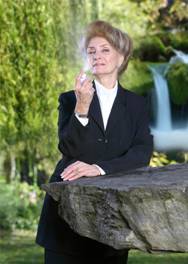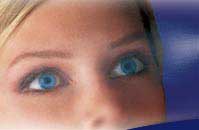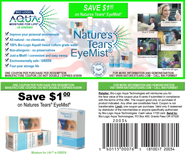
FOR IMMEDIATE RELEASE - January 18, 2012
Rogue Media
541-474-0950
New Education about the Growing Rate of Dry Eye Syndrome among Women, on Sharon Kleyne Hour Power of Water
Ilene K Gipson, PhD, of Harvard Medical School, talks with Sharon Kleyne about Women and Dry Eye
Hear Sharon Kleyne's interview with Dr. Ilene Gipson on World Talk Radio, Voice America, Green Talk Network and Apple iTunes
Sharon Kleyne, host of the Sharon Kleyne Hour Power of Water syndicated radio talk show, recently interviewed Ilene K Gipson, PhD, Professor of Ophthalmology at Harvard medical School and a leading authority on dry eye syndrome among women. The interview may be heard on-demand on World Talk Radio, Voice America, Green Talk Network and Apple iTunes.

An important Sharon Kleyne Hour Power of Water objective is to raise awareness of the growing worldwide crisis in dry eye disease, and proactive steps that may be taken to prevent or alleviate dry eye symptoms. Untreated dry eye disease, according to Sharon Kleyne, can lead to corneal ulceration, visual impairment and blindness
Sharon Kleyne is especially interested in the link between dry eye disease, air quality, polluted humidity, dry air, climate change, dehydrating indoor and outdoor environments and the amount of water we drink daily.
According to Dr. Gipson, two-thirds of the estimated 20 to 30 million dry eye patients in the United States are women. A large percentage of these women are peri-menopausal or post-menopausal (although many men, especially over age 50, are also susceptible to dry eye). Dr. Gipson emphasizes that dry eye symptoms in women relate mostly to changing bodies, hormone levels and lifestyle as they grow older. Women to not develop dry eye syndrome simply "because" they are women.
Women are more prone than men to dry eye mostly because they live longer and dry eye strongly correlates with age. It is believed that as we age, productivity in the eyelids' oil producing meibomian glands decreases. Meibomian glands feed the tear film's oil (or "lipid") layer, whose purpose is to seal moisture into the underlying and all-important "aqueous layer," which is 99% water. The less oil in the tear film, the more likely the water in the aqueous layer is to evaporate, causing dry eye symptoms.
Older people, both men and women, are more likely to take regular medication, which is often dehydrating and can cause dry eye symptoms. Women are more prone than men to autoimmune diseases (of which dry eye is a frequent symptom).
Dr. Gipson notes that dry eye symptoms (itching, burning and red eye) have become the #1 reason for eye doctor visits in the United States. She points out that dry eye syndrome is extremely complex and involves the surface of the eye, the tear (lachrymal) and lipid producing glands, the skin of the eyelids, the manner in which inflammation is processed by the brain and body, hormone production, microscopic tear film components, and the nervous system's connection to the brain. Abnormalities or stress on any part of this system can result in dry eye symptoms.
To prevent or alleviate dry eye symptoms, Dr. Gipson recommends eating foods with dark green vegetables and omega-3 fatty acids and getting adequate sleep at night. Sleeping lowers the tear film's pH and restores tear film moisture. It is also generally conducive to good health.
Sharon Kleyne commented on the importance of water to eye health, explaining that in many parts of the world, it is women who draw and carry water for their families and villages. For this reason, women are far more prone than men to diseases caused by drinking unsanitary water, including trichoma, which can cause blindness.
When Sharon Kleyne asked about computers and dry eye, Dr. Gipson noted that deep concentration at a computer can affect the eyes' blink rate. A slowed blink rate increases tear film moisture evaporation, resulting in dry eye symptoms. Indoor conditions such as insulated walls and windows and forced-air heating and cooling can also cause dry eye symptoms. The solution is to drink plenty of water and avoid dry air by humidifying the area around your computer.
Dr. Gipson's final word: Take care of your eyes through lifestyle habits and checkups. Also, take care of your whole body, not just its parts, and be sure to drink enough water each day. They are all interconnected.
Sharon Kleyne Hour Power of Water is sponsored by Bio-Logic Aqua Research, whose Nature's Tears® EyeMist®, a breakthrough hand-held personal all-natural water humidifying device for dry eye. Nature's Tears® EyeMist® is available at www.BioLogicAqua.com, Amazon.com, drugstore.com and selected drugstores nationwide.
Listen to the Sharon Kleyne Hour Power of Water Mondays, 10 a.m., PST/PDT. The syndicated radio talk show is heard on Voice America/World Talk Radio, Green Talk Network and Apple iTunes. Go to www.SharonKleyneHour.com for written summaries and on-demand replays. Also visit www.naturestears.com, whatistheeye.wordpress.com, "Nature's Tears EyeMist" on Facebook and "Bio-Logic Aqua" on Twitter.
Website: www.womenseyehealth.org.
© 2012 Bio-Logic Aqua Research









